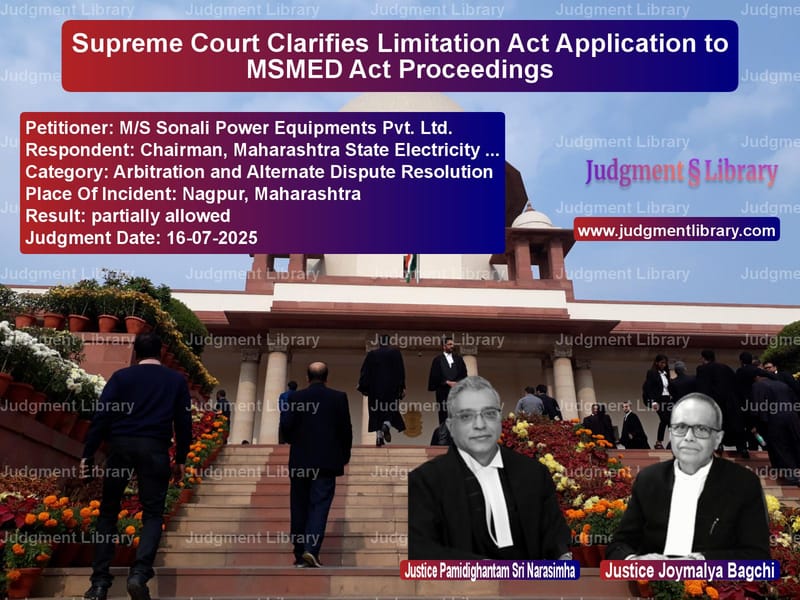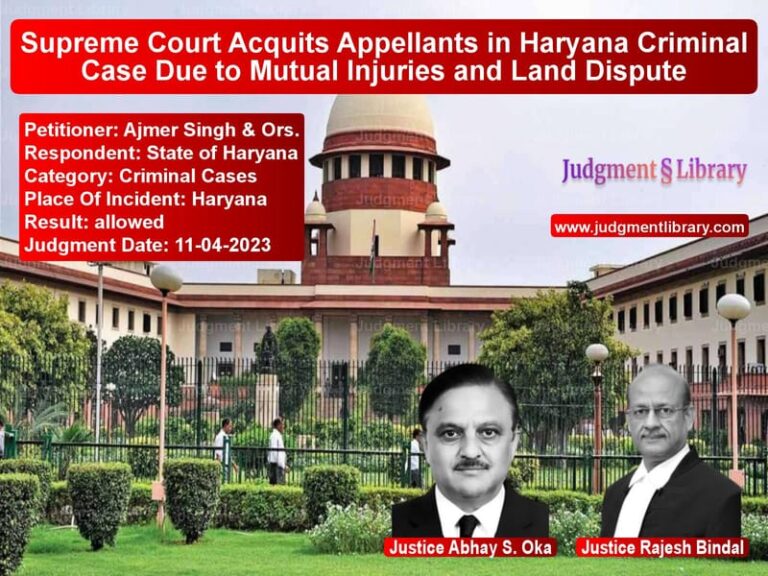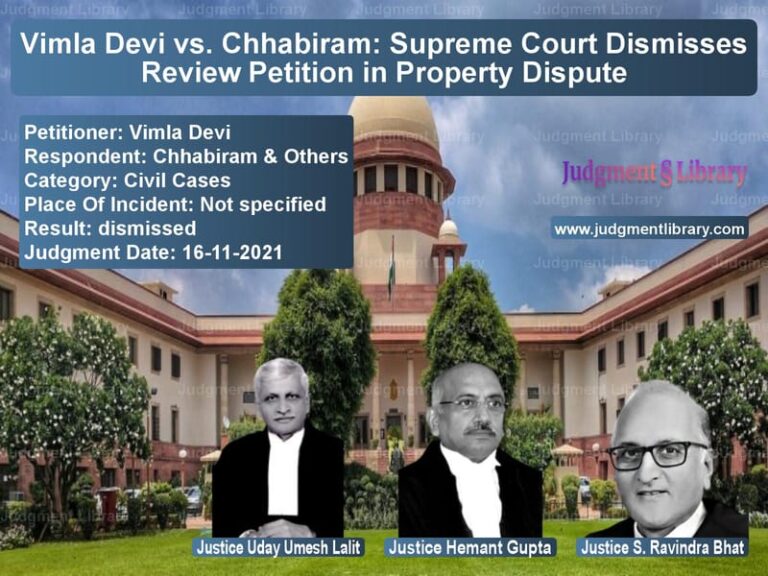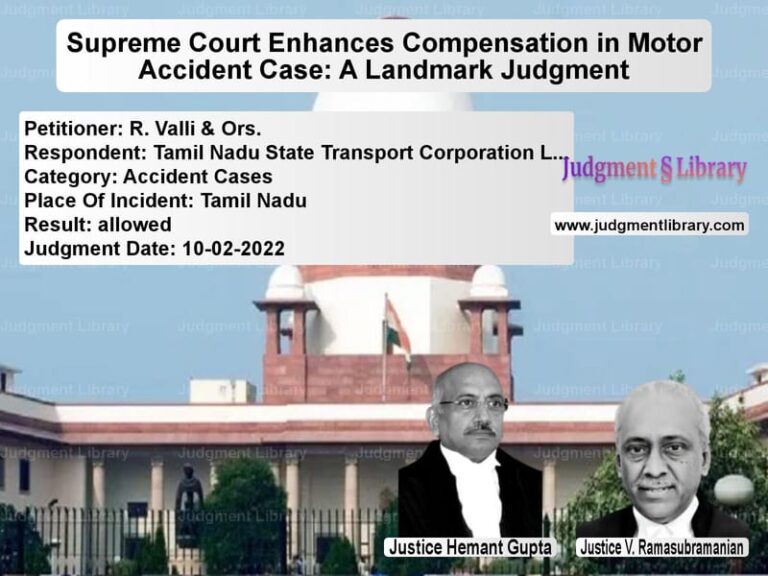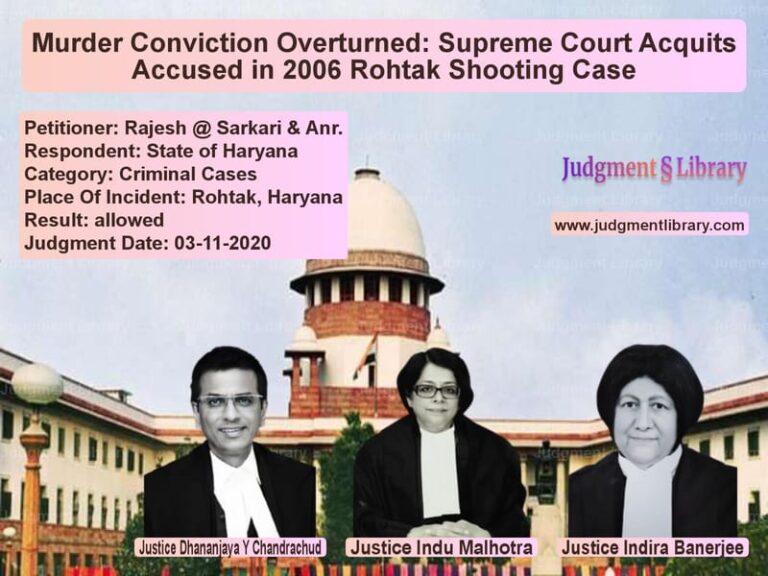Supreme Court Clarifies Limitation Act Application to MSMED Act Proceedings
In a landmark judgment that brings much-needed clarity to dispute resolution for micro, small, and medium enterprises, the Supreme Court of India has delivered a comprehensive ruling on the applicability of the Limitation Act to proceedings under the Micro, Small and Medium Enterprises Development Act (MSMED Act), 2006. The case of M/S Sonali Power Equipments Pvt. Ltd. versus Chairman, Maharashtra State Electricity Board, Mumbai & Ors., decided on July 17, 2025, addresses a crucial legal question that has significant implications for thousands of small businesses across India. The dispute centered around whether time-barred claims could be referred to conciliation and arbitration under the MSMED Act, and whether the provisions of the Limitation Act, 1963, apply to these proceedings. This judgment provides a balanced approach that protects the interests of small enterprises while maintaining the fundamental principles of limitation law.
The legal journey began when Sonali Power Equipments Pvt. Ltd., a small-scale industry registered with the District Industries Centre in Nagpur, supplied transformers to the Maharashtra State Electricity Board between 1993 and 2004. Due to delayed payments, the appellants filed references in 2005-06 before the Industry Facilitation Council under the Interest on Delayed Payments to Small Scale and Ancillary Industrial Undertakings Act, 1993. This Act was subsequently repealed by the MSMED Act, 2006, and the proceedings were taken up by the Micro and Small Enterprises Facilitation Council under the new legislation. The Facilitation Council allowed the appellants’ claims and awarded interest on delayed payments through an award dated January 28, 2010.
However, the respondents challenged this award before the Commercial Court, which set aside the award on the ground that the claims were barred by limitation. The appellants then approached the High Court, which referred the matter to a larger bench to decide the fundamental question of whether the Limitation Act applies to proceedings under the MSMED Act. The full bench of the High Court ultimately held that the Limitation Act applies to both conciliation and arbitration proceedings under the MSMED Act, leading to the present appeal before the Supreme Court.
The Core Legal Questions
The Supreme Court identified two primary issues for determination in this case. The first issue was whether the Limitation Act applies to conciliation proceedings under Section 18(2) of the MSMED Act, and even if not, whether time-barred debts can be referred to conciliation. The second issue was whether the Limitation Act applies to arbitration proceedings under Section 18(3) of the MSMED Act, and whether time-barred debts can be referred to arbitration. Additionally, the Court examined the effect of disclosure of unpaid amounts in the buyer’s financial statements as mandated under Section 22 of the MSMED Act on the limitation period.
The appellants, represented by Senior Counsel Dr. Abhishek Manu Singhvi and Mr. Jayant Bhushan, made several key arguments. They contended that the decision in Silpi Industries, which held that the Limitation Act is applicable to arbitration proceedings under Section 18 of the MSMED Act, was per incuriam because Section 2(4) of the Arbitration and Conciliation Act (ACA), which excludes the applicability of Section 43 of the ACA to statutory arbitrations, was not brought to the Court’s notice. The appellants also argued that the Limitation Act only applies to courts and not to quasi-judicial bodies or tribunals, and there is no provision under the MSMED Act providing for the applicability of the Limitation Act to proceedings under it.
Another significant argument advanced by the appellants was that Section 22 of the MSMED Act, which mandates the buyer to disclose in its books of accounts the principal amount and interest due thereon that remains unpaid to any supplier, constitutes an acknowledgement of debt that extends the period of limitation as per Section 18 of the Limitation Act. The appellants emphasized that the MSMED Act was enacted with the object of protecting suppliers, and no injustice would be caused to the buyer if the Limitation Act is not applicable. Regarding conciliation proceedings, they argued that if time-barred claims cannot be referred to conciliation, it would render Section 25(3) of the Indian Contract Act, 1872 otiose, which enables parties to agree to pay time-barred debts.
The Supreme Court’s Analysis on Conciliation Proceedings
The Supreme Court delivered a nuanced judgment that distinguished between conciliation and arbitration proceedings under the MSMED Act. On the issue of conciliation under Section 18(2), the Court held that the Limitation Act does not apply to conciliation proceedings. The Court provided detailed reasoning for this conclusion, noting that “conciliation is not an adjudicatory or judicial process where the conciliator hears the parties and decides a dispute.” Instead, conciliation is a process where parties resolve their disputes through settlement, with the conciliator assisting them in arriving at a compromise.
The Court emphasized that “the parties to the conciliation resolve their disputes through settlement, whose terms may be arrived at with the assistance of the conciliator.” The role of the conciliator is to guide and assist the parties, make proposals for settlement, formulate terms of settlement, and reformulate them based on the parties’ observations. The Court noted that “the conciliator must be guided by the principles of independence, impartiality, objectivity, justice, equity, fair play, fairness, and confidentiality.”
Most importantly, the Court observed that “there is no provision that extends the applicability of the Limitation Act to conciliation proceedings” in either the MSMED Act or the Arbitration and Conciliation Act. The Court clarified that “conciliation being an out-of-court and non-adjudicatory process of dispute resolution, the Limitation Act cannot be extended to it.”
The Court also addressed the High Court’s reliance on the term “amount due” in Sections 17 and 18 of the MSMED Act to exclude time-barred claims from conciliation. The Supreme Court distinguished this case from the precedent in V.R. Kalliyanikutty, noting that “the recovery process considered in V.R. Kalliyanikutty can be said to stand on a different footing than conciliation under Section 18(2) of the MSMED Act.” The Court explained that while the recovery process in V.R. Kalliyanikutty was judicial and coercive, conciliation is non-adjudicatory and based on negotiation and settlement.
The Court provided a crucial rationale for allowing time-barred claims in conciliation, stating that “the statute of limitation only bars the remedy, but does not extinguish the underlying right, which in this case is the right to recover the unpaid amount and interest thereon.” The Court noted that “the creditor can recover a time-barred debt, other than through remedies through a court of law” and that “a settlement agreement for a time-barred claim arrived at between the buyer and supplier through conciliation under Section 18(2) is precisely in the nature of a contract recognised and declared valid under Section 25(3) of the Contract Act.”
The Supreme Court’s Analysis on Arbitration Proceedings
On the issue of arbitration under Section 18(3) of the MSMED Act, the Supreme Court reached a different conclusion, holding that the Limitation Act does apply to arbitration proceedings. The Court affirmed its earlier decision in Silpi Industries, which had held that the Limitation Act is applicable to arbitration under the MSMED Act. The Court provided additional reasoning to support this conclusion, analyzing the interplay between Section 2(4) of the Arbitration and Conciliation Act and Section 18(3) of the MSMED Act.
The Court noted that “Section 18(3) of the MSMED Act will prevail over Section 2(4) of the ACA” due to the overriding effect provided in Section 24 of the MSMED Act. The Court explained that “there is a clear legislative intent that the provisions of the MSMED Act will have an overriding effect in case of inconsistency, which is evidenced from the non-obstante clause in Section 18 and the express language in Section 24.”
The Court emphasized that “the applicability of the ACA to arbitrations under the MSMED Act is not determined by Section 2(4) of the ACA, and is rather determined as per Section 18(3) of the MSMED Act.” The Court further stated that “pursuant to the deeming fiction ingrained in the language of Section 18(3), the arbitration conducted thereunder would attract the provisions that are otherwise applicable when there is an arbitration agreement. This includes Section 43, thereby making the Limitation Act applicable to arbitral proceedings under the MSMED Act.”
The Court also addressed the appellants’ contention that the decision in Lanco was per incuriam and contrary to the earlier decision in TANGEDCO. After analyzing both decisions, the Court concluded that “the issue of applicability of the Limitation Act to statutory arbitrations is not an issue determining the rights and liabilities of the parties in TANGEDCO” and that “the decision in Lanco is not per incuriam, and there is no conflict between these judgments.”
The Effect of Section 22 Disclosure on Limitation
The Court also addressed the appellants’ argument regarding the effect of Section 22 of the MSMED Act, which mandates buyers to disclose unpaid amounts in their financial statements. The appellants contended that such disclosure amounts to an acknowledgement of debt that extends the limitation period under Section 18 of the Limitation Act.
The Court referred to its decision in Asset Reconstruction Co. (India) Ltd. v. Bishal Jaiswal, which reaffirmed that “an entry in the balance sheet of the debtor would amount to an acknowledgement of liability as per Section 18 of the Limitation Act.” However, the Court also noted that “it is not uncommon for such entry to have notes annexed, or the auditor’s report that must be read along with the balance sheet, that indicate that such entry does not amount to an acknowledgement of debt for reasons stated therein.”
The Court concluded that “the entry made therein must be examined on a case-to-case basis to determine whether it amounts to an acknowledgement of debt as per the requirements of Section 18 of the Limitation Act.” This means that while disclosure under Section 22 may potentially extend the limitation period, it must be evaluated in the specific context of each case.
The Court’s Final Ruling and Its Implications
In its concluding remarks, the Supreme Court summarized its findings as follows: “The Limitation Act does not apply to conciliation proceedings under Section 18(2) of the MSMED Act. A time-barred claim can be referred to conciliation as the expiry of limitation period does not extinguish the right to recover the amount, including through a settlement agreement that can be arrived at through the conciliatory process.” However, “The Limitation Act applies to arbitration proceedings under Section 18(3) of the MSMED Act.”
The Court partly allowed the appeals, setting aside the High Court’s order to the extent of the applicability of the Limitation Act to conciliation proceedings while upholding its decision regarding arbitration proceedings. This judgment strikes a careful balance between protecting the rights of micro, small, and medium enterprises to recover their dues while maintaining the fundamental principles of limitation law that prevent the litigation of stale claims. The ruling provides much-needed clarity on the procedural aspects of dispute resolution under the MSMED Act and will have significant implications for how small businesses approach recovery of delayed payments in the future.
Petitioner Name: M/S Sonali Power Equipments Pvt. Ltd..Respondent Name: Chairman, Maharashtra State Electricity Board, Mumbai & Ors..Judgment By: Justice Pamidighantam Sri Narasimha, Justice Joymalya Bagchi.Place Of Incident: Nagpur, Maharashtra.Judgment Date: 16-07-2025.Result: partially allowed.
Don’t miss out on the full details! Download the complete judgment in PDF format below and gain valuable insights instantly!
Download Judgment: ms-sonali-power-equ-vs-chairman,-maharashtr-supreme-court-of-india-judgment-dated-16-07-2025.pdf
Directly Download Judgment: Directly download this Judgment
See all petitions in Arbitration Awards
See all petitions in Conciliation Proceedings
See all petitions in Dispute Resolution Mechanisms
See all petitions in Arbitration Act
See all petitions in Settlement Agreements
See all petitions in Contract Disputes
See all petitions in Debt Recovery
See all petitions in Judgment by P.S. Narasimha
See all petitions in Judgment by Joymalya Bagchi
See all petitions in partially allowed
See all petitions in supreme court of India judgments July 2025
See all petitions in 2025 judgments
See all posts in Arbitration and Alternate Dispute Resolution Category
See all allowed petitions in Arbitration and Alternate Dispute Resolution Category
See all Dismissed petitions in Arbitration and Alternate Dispute Resolution Category
See all partially allowed petitions in Arbitration and Alternate Dispute Resolution Category

